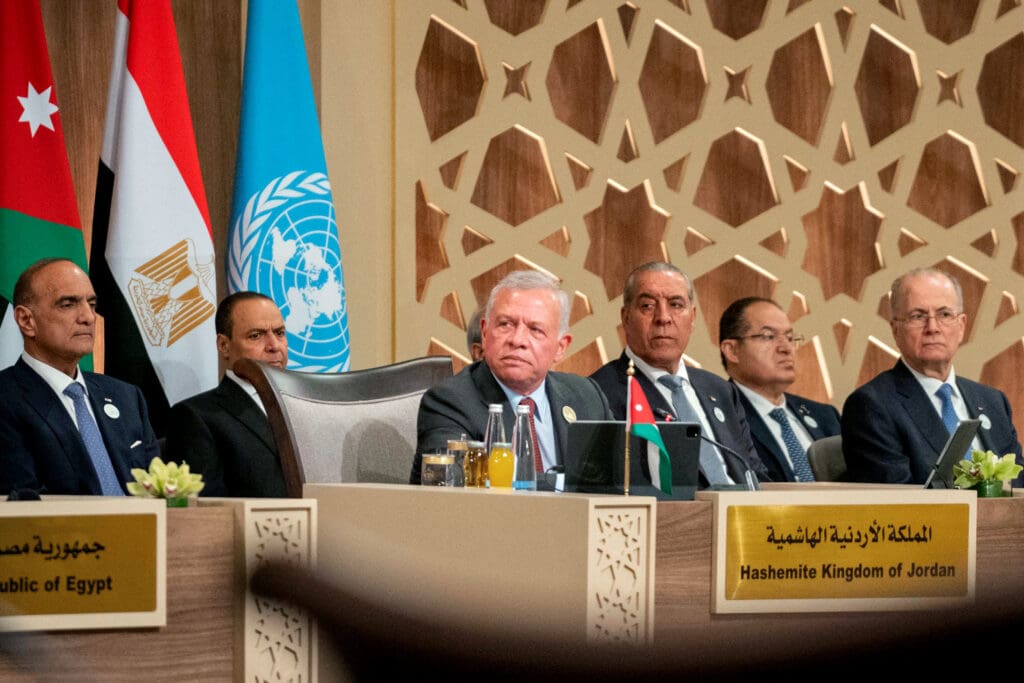The ongoing Israeli war on Gaza is seen by the Jordanian government and public as an existential threat. Despite credible accusations of genocide, Israeli Prime Minister Benjamin Netanyahu is prolonging, expanding, and escalating the offensive, which has led to mounting pressure on neighboring Jordan. From the potential forced displacement of Palestinians from the West Bank and the threat of regional war to dependence on Israel for energy and water and popular discontent over the government’s decision to maintain bilateral ties, officials in Amman are grappling with a wide array of potentially destabilizing forces.
External Threats
Jordan is justifiably concerned and angered by Israel’s behavior. While the policies of successive Israeli governments have generated significant anxiety in Amman in recent years, the current Netanyahu administration has taken things to a new level. Under the cover of its devastating military campaign in Gaza, the government has taken unprecedented steps to consolidate its hold over the West Bank through annexationist policies. It has also imposed two of the deadliest years for Palestinians in decades, brought the Palestinian Authority to the brink of collapse, forcibly displaced numerous villages and allowed extremist Jewish settlers to rampage through Palestinian communities. Indeed, in the weeks after October 7, settlers reportedly left leaflets in villages warning residents to flee to Jordan or face mass expulsion or death.
This has led to fears of a revival of the erstwhile Israeli scheme to turn the kingdom into an “alternative homeland” for Palestinians—the “Jordan is Palestine” option. Moreover, radical elements advocating the destruction of the Haram Al-Sharif in Jerusalem and the building of a “third temple” in its stead have moved from the fringes of Israeli politics to include powerful members of the current government. Given that the Hashemite ruling family in Jordan is the custodian of Muslim and Christian holy sites in the city, such provocations put Jordan in a tense and difficult position.
At the same time, Jordan finds itself in a precarious spot regionally as the Iran-led “Axis of Resistance” has, at least partially, mobilized militarily to confront Israel. As a close ally of the United States with its own longstanding ties to Israel, Jordan risks getting caught in the crossfire. It has so-far drawn a clear line between itself and the axis by thwarting attacks on Israel across its sovereign territory, but Amman is also engaging directly with Iran in the hopes of dissuading Tehran, and its allies, from infringing on Jordanian borders again. In April, Iraqi militias associated with the axis declared they planned on recruiting and arming 12,000 fighters inside Jordan in preparation for a wider confrontation with Israel. Syria has also been involved in activity viewed as threatening to Jordan, including using its territory to smuggle weapons and illicit narcotics.
To avoid losing the moral high ground in the region, Jordan also wants to avoid being seen as complicit in Israel’s war crimes, or U.S. backing for them, against the Palestinians. Jordan’s continued engagement with the Israelis is used by the axis to justify their covert smuggling and recruitment operations in the kingdom.
But the threat of a full-scale regional war looms large for Jordan, which will have a difficult time evading the fallout due to its location between Israel and Iran. Days after a pair of Israeli assassinations against high-profile Hezbollah and Hamas leaders in Beirut and Tehran respectively, Amman dispatched Foreign Minister Ayman Safadi to Tehran to urge caution.
Israel’s Leverage on Jordan’s Energy and Water Needs
One of the links connecting the external and internal pressures on Jordan is its growing reliance on Israel for key imports—namely water and natural gas.
Since signing their peace agreement in 1994, Israel has agreed to sell Jordan 50 million cubic meters of water per year at a nominal price. In 2021, then Alternate Prime Minister Yair Lapid agreed to double the amount of water sold to Jordan annually—an arrangement which the current government agreed to extend until the end of 2024. The impending expiration leaves a Sword of Damocles hanging over the heads of officials in Amman.
Jordan also depends on Israel to provide 40% of its electricity-generating needs through a natural gas pipeline connected to the Leviathan gas field in the Mediterranean Sea. Last month, Israeli energy minister Eli Cohen announced that Israel plans to double its gas exports to Jordan and Egypt to “strengthen diplomatic ties.”
From the perspective of the Jordanian public, however, increasing gas imports from Leviathan would constitute increased Israeli leverage over Amman. This is why continued coordination with Israel on water or energy is strongly opposed by the Jordanian public who fear that Israel could close the tap to force Amman’s hand.
Another pressure point is the operations of the United Nations Relief and Works Agency for Palestinian Refugees, UNRWA, which has a significant presence inside Jordan and has been under extreme financial pressure since October 7. Although most Palestinians in Jordan have citizenship, UNRWA continues to support millions of Palestinians in the kingdom—providing education, medical care and other services. It is also one of the kingdom’s largest employers.
Since October 7, Israel has ramped up its war on UNRWA, causing a funding crisis as sixteen countries suspended funding for the agency. This added to the domestic economic and social pressure inside Jordan. Although all donor countries (except the U.S.) have since resumed funding, this incident set a dangerous precedent to which Jordan was compelled to respond. In recent months, King Abdullah II went to great lengths to rally support for UNRWA, including gathering 150 states and international organizations at the Dead Sea to surge funding and diplomatic support.
Jordanian Israeli Relations and the Upcoming Elections
Amid Israel’s ongoing destruction of Gaza, the rhetoric of Jordanian officials towards Israel is reaching a level of severity unseen since Netanyahu’s botched assassination attempt of Hamas leader Khaled Mashaal in the streets of Amman in 1997. Back then, Jordan threatened to annul its peace agreement with Israel, shutter the Israeli embassy and place the arrested Mossad agents before a televised court-martial. Today, like in 1997, Jordan’s leadership has determined to downgrade relations with Israel and has even threatened to sever diplomatic ties if the Palestinians are displaced en masse from Gaza or the West Bank. Jordan is also supporting South Africa’s genocide case against Israel at the International Court of Justice. But it has stopped short of cutting ties and continues to buy energy and water resources.
Even before the war, 94% of Jordanians opposed their country’s recognition of Israel and the continuation of official relations. This puts public sentiment in direct contradiction with the government’s decision to stay committed to the Wadi Araba Treaty, which set the terms for peace between Israel and Jordan. This tension has only intensified since Israel began to perpetrate acts of genocide in Gaza, as Jordanians have mobilized across the political spectrum in opposition. Leftists, Islamists and tribal leaders are coalescing under one banner and coordinating action through “Al-Multaqa Al-Watani” (The National Forum). This forum, which was created in 2022, has the stated aims of “supporting the resistance and protecting the homeland.”
With parliamentary elections scheduled for September 2024, the public debate on Jordan’s posture towards Israel and Palestine is only expected to intensify. The winning coalition, regardless of its ideological standing, will certainly enter parliament with grand promises about championing the Palestinian cause. However, it will quickly be hit with a rude awakening about the limited options it has due to the significant leverage that Israel holds over the country’s water and electricity supply, as well as U.S. pressure.
Annulling the peace agreement with Israel, which many Jordanians have called for, in response to the genocide in Gaza, would result in a significant shortfall in Jordan’s water supply. Furthermore, refusing imports of natural gas would trigger international arbitrage because Jordan’s main electricity provider, NEPCO, signed a legally binding agreement to buy gas from Israel’s Leviathan gas field for 15 years, or until 2030. Therefore, the next parliament will almost certainly fail to deliver a meaningful change in the relationship, likely furthering disillusionment among the public.
Yet, in the long term, Jordan can take steps to reduce Israel’s leverage on the kingdom’s water and electricity supply. It is already working to construct a massive desalination facility to meet an anticipated rise in demand. The government is also planning to construct a nuclear power plant, which would eliminate the need to import gas from Israel.
Water and energy independence will reduce Israel’s leverage over Jordan and empower Amman to act more confidently on the regional and global stage. Until that is achieved, however, Jordanian diplomats will likely continue their balancing act.


